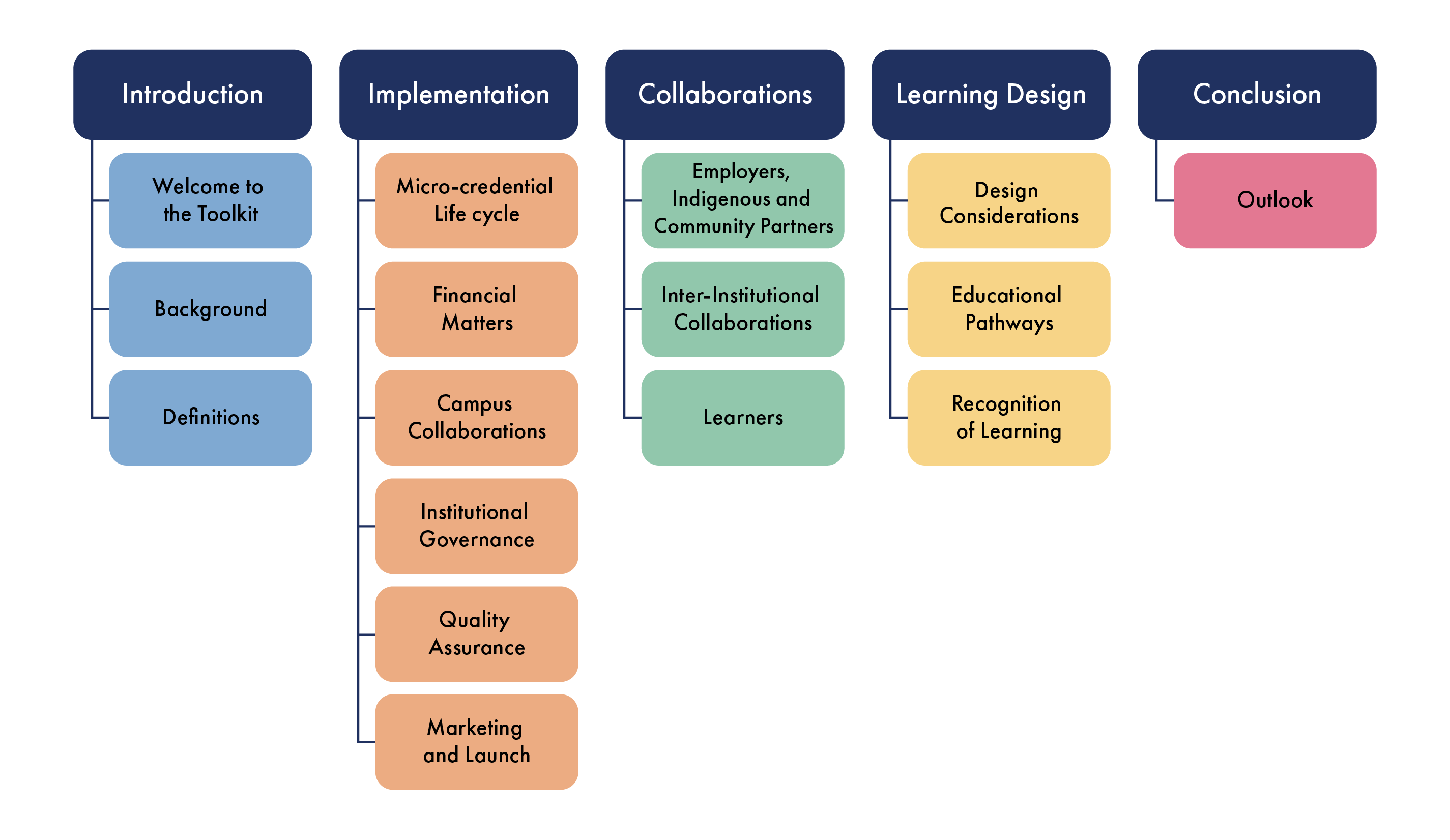Welcome to the Micro-credential Toolkit for B.C.
Chapter Audience:
 Administrators
Administrators Program Managers
Program Managers Faculty
Faculty
How Did This Toolkit Come About?
In February 2021, the Ministry of Post-secondary Education and Future Skills announced a first round of funding for the development of a new type of credential. Micro-credentials “recognize stand-alone, short duration learning experiences that are competency-based, align with industry, employer, community and/or Indigenous community needs and can be assessed and recognized for employment or learning purposes” (Micro-credential Framework for B.C.’s Public Post-secondary Education System, 2021, p. 6).
Micro-credentials are different from the traditional credentials offered at most post-secondary institutions. They are competency-based, can be credit or non-credit bearing, and are usually recognized with a digital badge. Most notably, they require academics to work together with external partners like employers, professional associations, and Indigenous and community organizations to not only identify areas of training need but also collaborate on design and delivery. Many institutions are actively engaged in discussions about how to implement and integrate micro-credentials into their existing credential ecosystem. This often requires internal collaborations between several units that previously had few opportunities to work together. Micro-credentials require new approaches and processes at many post-secondary institutions.
In Ontario, eCampusOntario published a Micro-credential Toolkit in June 2022. Interest in this tool surpassed expectations. It’s clear that institutions are looking for resources to help them operationalize micro-credentials.
In fall 2022, BCcampus launched a project to create a made-in-British Columbia micro-credential toolkit. The goal was to use eCampusOntario’s Micro-credential Toolkit as a starting point and expand on areas specific to B.C. This was felt to be important because Ontario and B.C. post-secondary education is organized differently in each province, and this impacts the information in the toolkit. For example, B.C. published a Micro-credential Framework in 2021 to help institutions align in their definition of this new credential, while Ontario has not adopted a provincially suggested definition. Ontario has a framework that defines credentials uniformly across the province, but in B.C. each institution creates its own credential framework. Such differences impact the resources needed to support institutions as they work to develop and offer micro-credentials.
To kick off the project, we conducted a survey of B.C. post-secondary institutions last year. It drew responses from 18 institutions. We supplemented this data with a few focus groups with stakeholders of micro-credential training. We learned that micro-credentials are an active area of development in many institutions. Institutions are working to define them, to identify who will have primary responsibility for them, to determine how they will be reviewed and approved, and how best to support them. Institutions expressed the most interest in learning how to involve external partners in the development and validation of micro-credentials, developing policies and procedures supporting them, and establishing business models that ensure that micro-credentials are sustainably funded.
From this information, we decided to create a completely new resource for B.C.
What To Expect from This Toolkit
We created this toolkit to address the needs expressed by the B.C. post-secondary community. It assembles a collection of resources to help people engaged in offering micro-credentials.
It was clear from the survey and focus groups that many institutions are developing solutions and innovating quickly in this field. What’s missing is a forum to share practices and lessons so institutions are not reinventing the wheel on their own each time they face a similar challenge.
This toolkit provides that forum. It captures over 30 stories from B.C. micro-credential practitioners that share the context and challenges they faced and how they found a solution. These experiences can provide inspiration for building micro-credentials at other institutions, and the practitioners who shared them can serve as expert resources. Most stories end with a Top Tips section that summarizes the lessons learned or recommendations from each practitioner. These stories provide an emergent community of practice and break institutional barriers to help all post-secondary institutions build a stronger micro-credential ecosystem.
The stories capture a moment in time in the system, as institutions work to understand how micro-credentials will fit at their institutions. As the practice of creating micro-credentials matures, these stories may become less relevant as practitioners work through other phases in the evolution of micro-credentials. This toolkit is not meant to be evergreen; it’s meant to support post-secondary institutions now, as they work to launch a new type of credential.
How to Navigate This Toolkit
To have the best experience navigating this pressbook, we recommend you review the Tips for Accessing This Book. There, you will find information about where to find the table of contents for each chapter, how to ensure you do not lose your place in a chapter when you visit outside links, and how to make visible all the information in a chapter.
Each chapter begins with a brief overview to help readers quickly decide whether it aligns with their needs. Each chapter also includes an intended audience that falls into three categories:
- Administrators
 : Practitioners who lead micro-credential efforts at an institution, put in place systems to facilitate the work of others in developing the curriculum, and ultimately are accountable for its success. They are usually senior leaders such as deans, directors, or vice presidents.
: Practitioners who lead micro-credential efforts at an institution, put in place systems to facilitate the work of others in developing the curriculum, and ultimately are accountable for its success. They are usually senior leaders such as deans, directors, or vice presidents. - Program managers
 : Practitioners who coordinate the efforts of a team to develop a micro-credential “on the ground.” They manage communications and ensure workflow between subject-matter experts, instructors, and support staff. They are usually managers, project managers, instructional designers, educational developers, or program coordinators.
: Practitioners who coordinate the efforts of a team to develop a micro-credential “on the ground.” They manage communications and ensure workflow between subject-matter experts, instructors, and support staff. They are usually managers, project managers, instructional designers, educational developers, or program coordinators. - Faculty
 : Subject-matter experts. They include instructional staff at post-secondary institutions and working professionals who advise, create, and teach work-aligned curriculum.
: Subject-matter experts. They include instructional staff at post-secondary institutions and working professionals who advise, create, and teach work-aligned curriculum.
The intended audiences for each chapter are based on the contents of the chapter and the group most liked to gain from, and be interested in, the information. However, all groups could benefit from reading any chapter.
Each chapter contains a table of contents (with each item linked) to help readers find what they’re looking for.
The chapters include information to engage readers in the development and offering of micro-credentials, questions to ask before planning work, suggested resources, and stories from B.C. practitioners who solved one challenging aspect of that work. Sometimes, when there are many stories (especially in chapters that cover active areas of development for many B.C. post-secondary institutions), the stories are included in a companion chapter to ensure the length of each chapter is manageable.
The toolkit is organized in five sections (Figure 1).
- Introduction: Three chapters, including this one, to help readers get their bearings. It provides the what and why of micro-credentials.
- Implementation: How an institution can administer and manage micro-credentials. It’s about internal processes to support micro-credentials.
- Collaborations: How an institution can manage relationships with outside partners. It’s about finding, defining, and sustaining partnerships.
- Learning design: How the curriculum fits within the existing credential ecosystem and how to recognize it. It’s focused on the instructional aspects of the credential.
- Conclusion: What comes next for the toolkit and what’s on the horizon for micro-credentials in B.C. and globally.

In recognition that many stakeholders are involved in developing micro-credentials, and that each group has different roles and responsibilities and need different resources, each chapter in this toolkit is self-contained.
Contribute Your Stories
The BCcampus Micro-credential Toolkit for B.C. captures a moment in time in the province’s development of micro-credentials. No doubt, as the practice of micro-credentials matures, the system will solve other aspects of their delivery not yet anticipated. With your feedback, we can ensure that the toolkit evolves and continues to align with the needs of the community. As you engage in micro-credential practice, keep an eye out for innovative approaches you develop that could benefit others. Consider contacting us, so that we can learn from your innovations and consider including them in future versions of this toolkit. By combining our experiences, we can build a strong micro-credential ecosystem that supports the lifetime educational journeys of adult learners in British Columbia.
Happy micro-credentialing!

